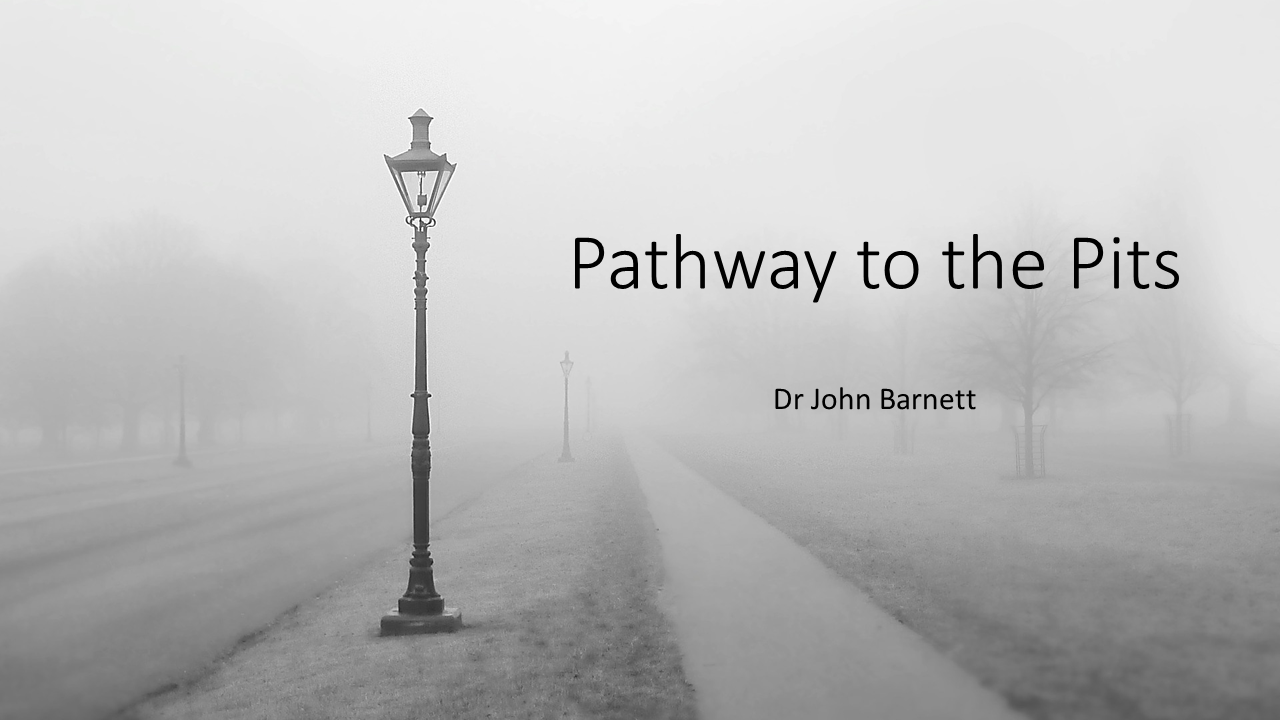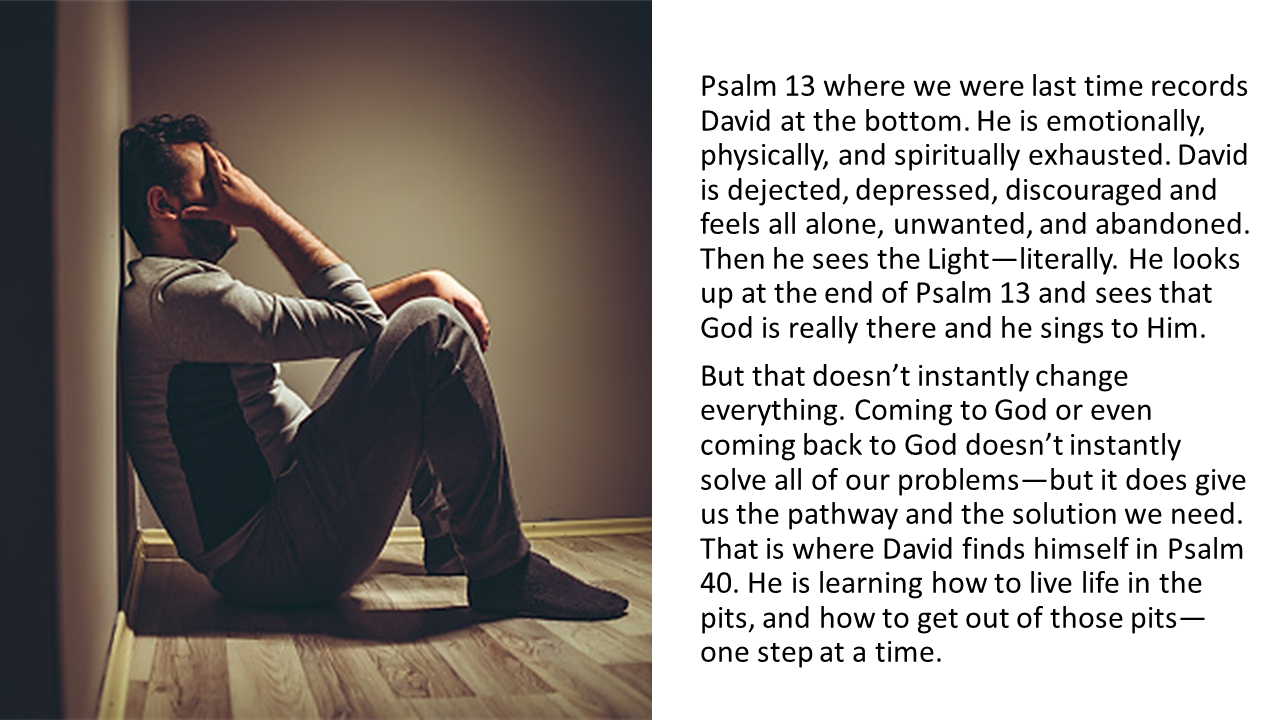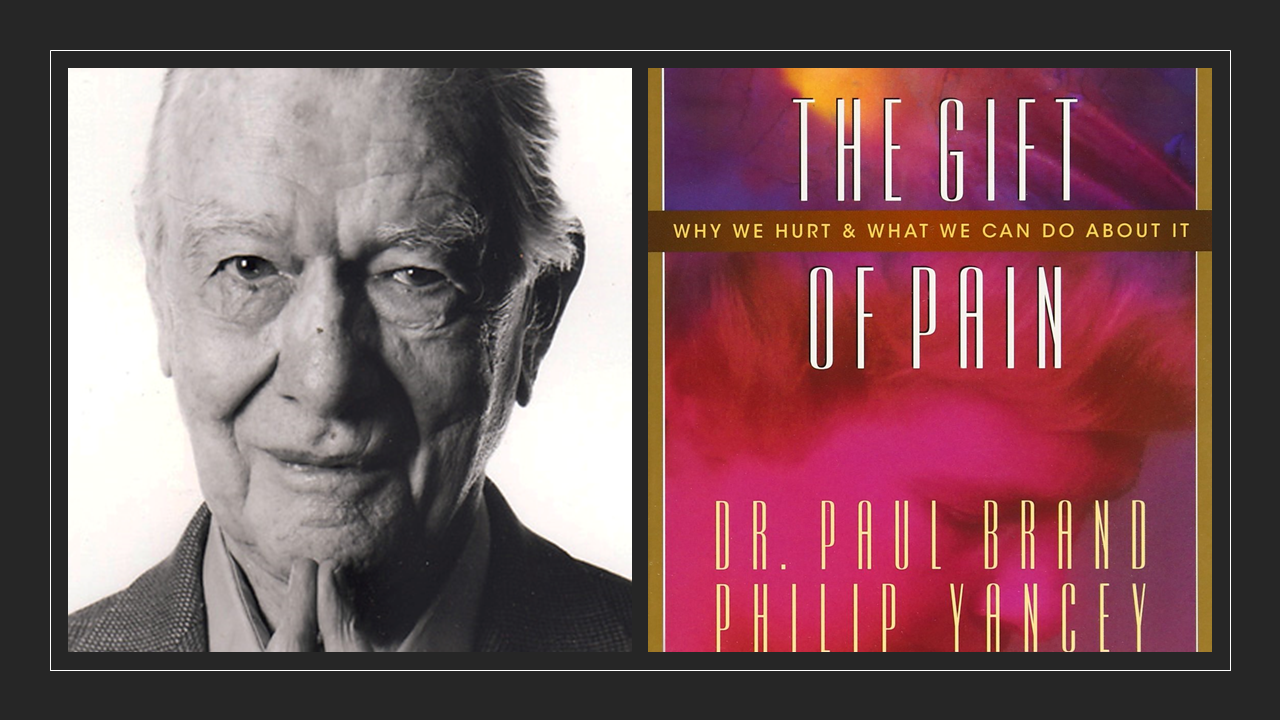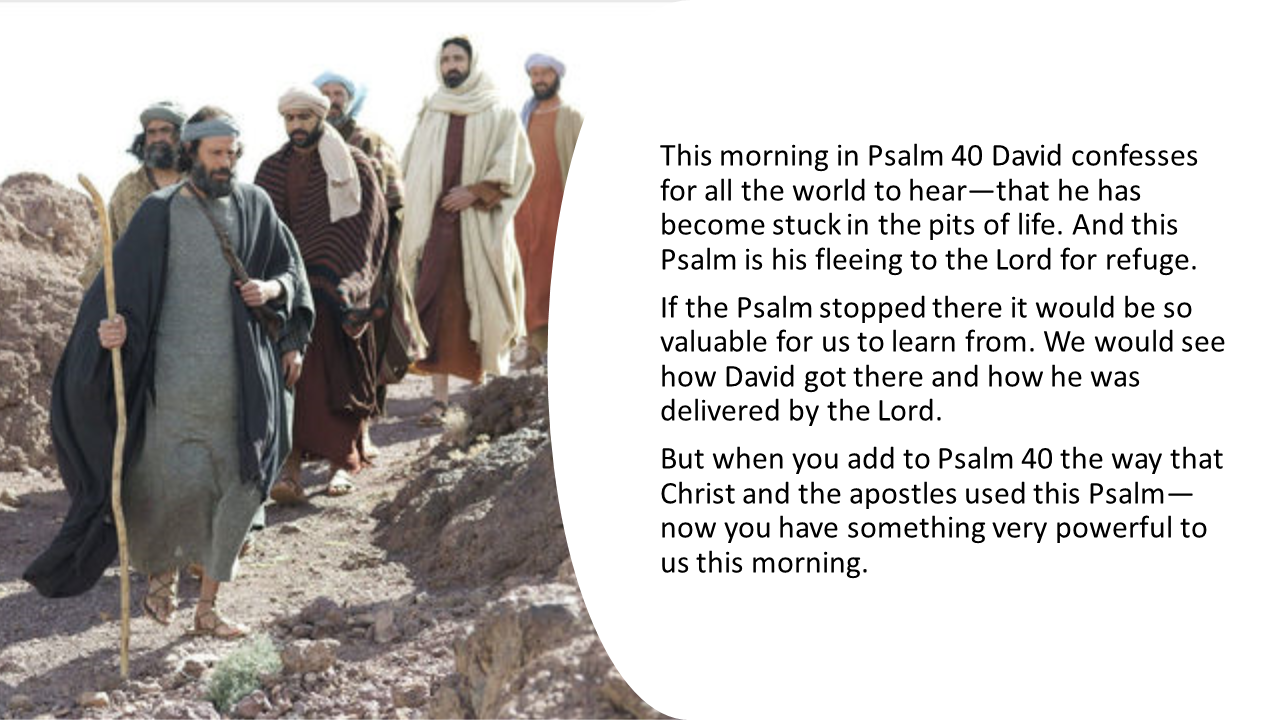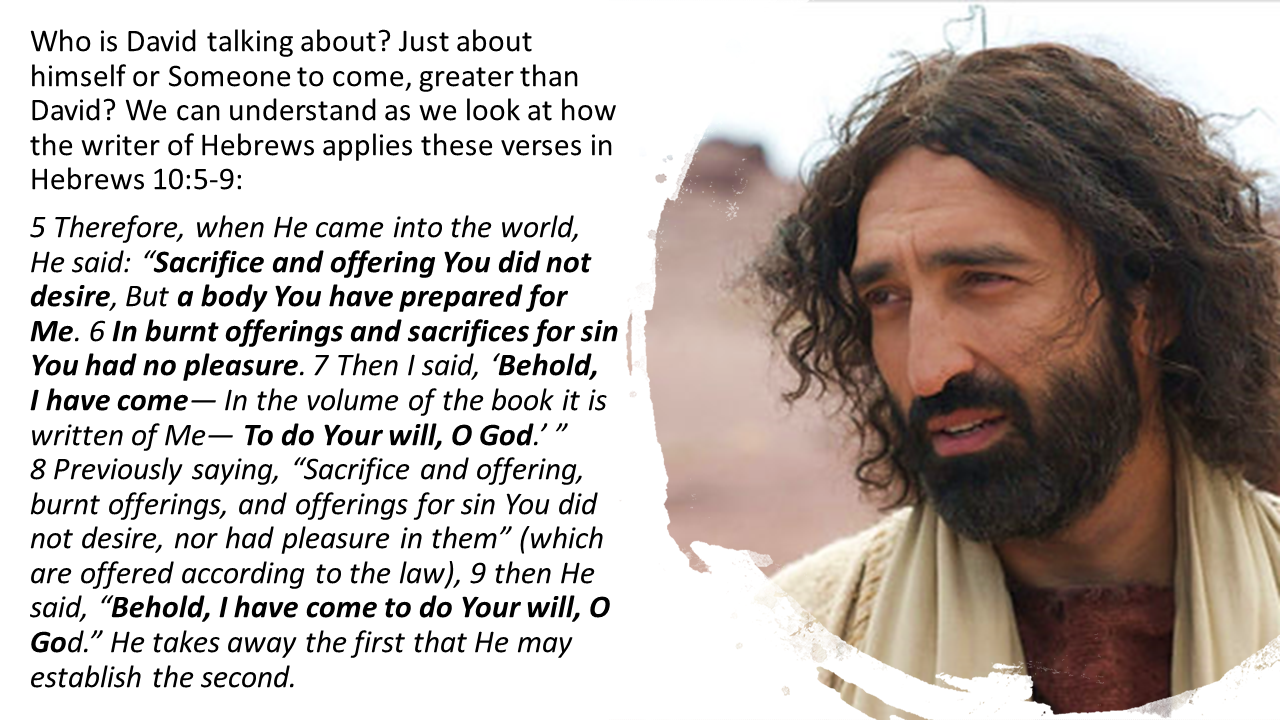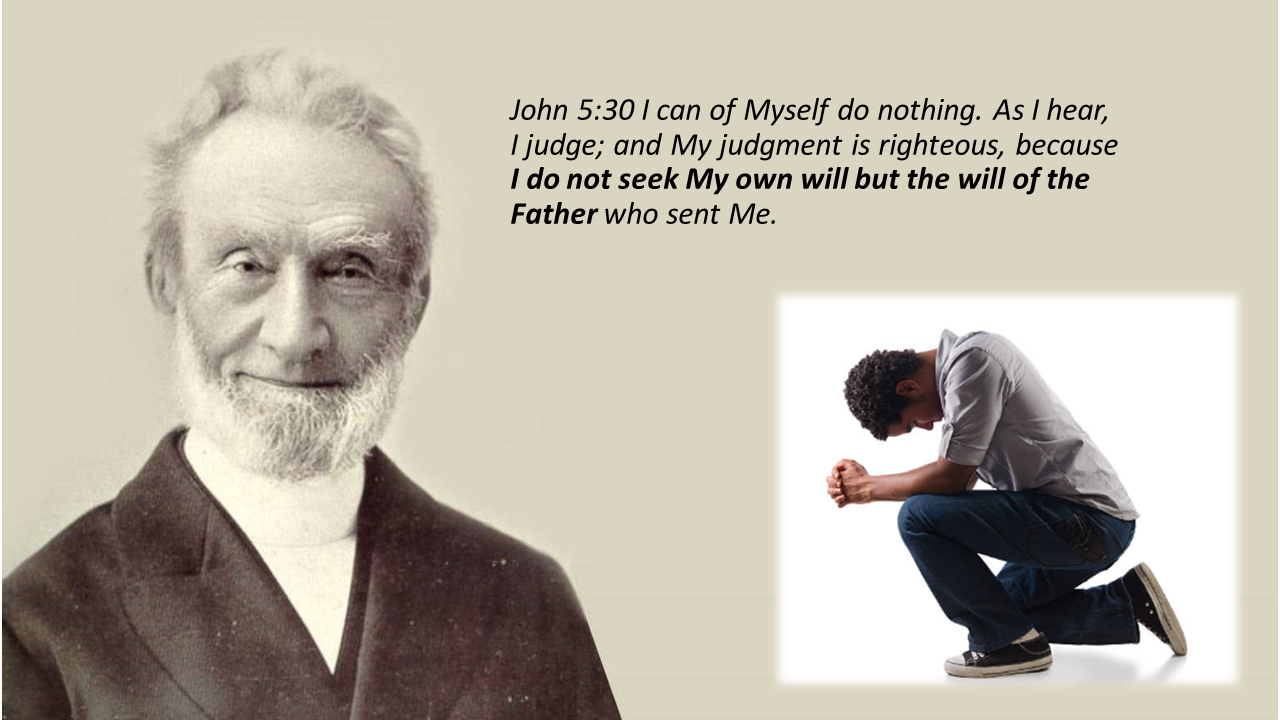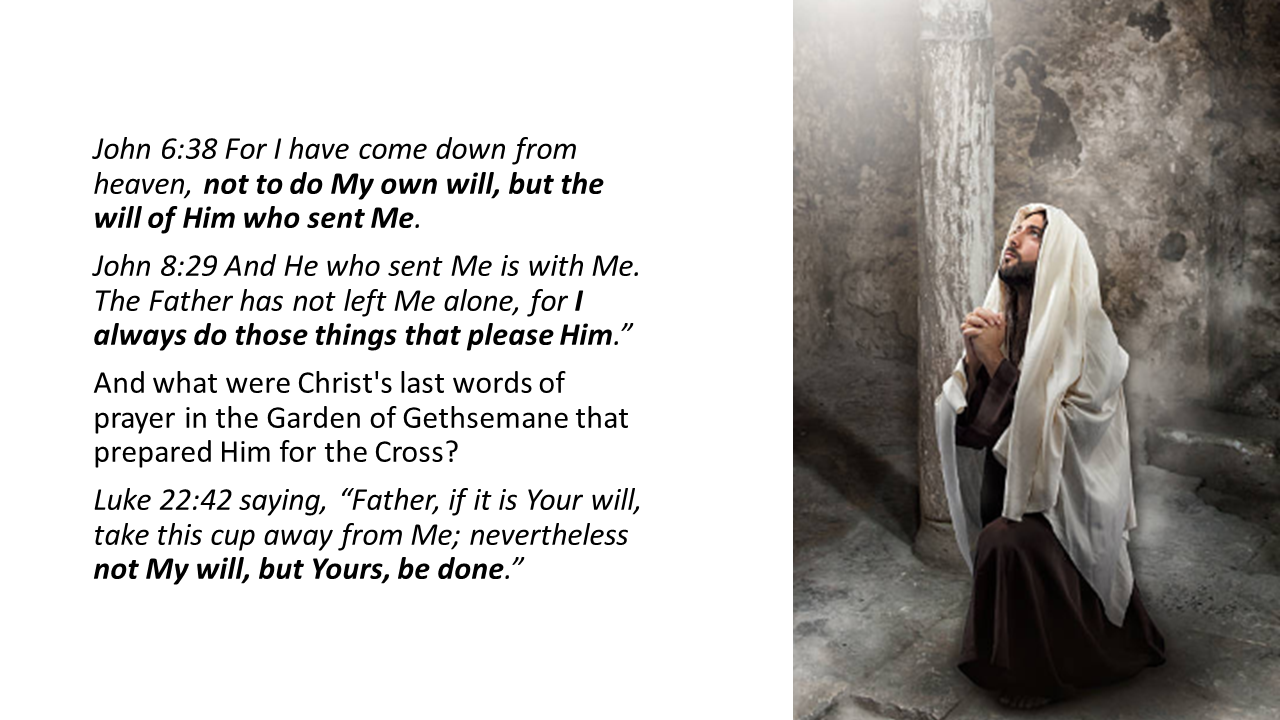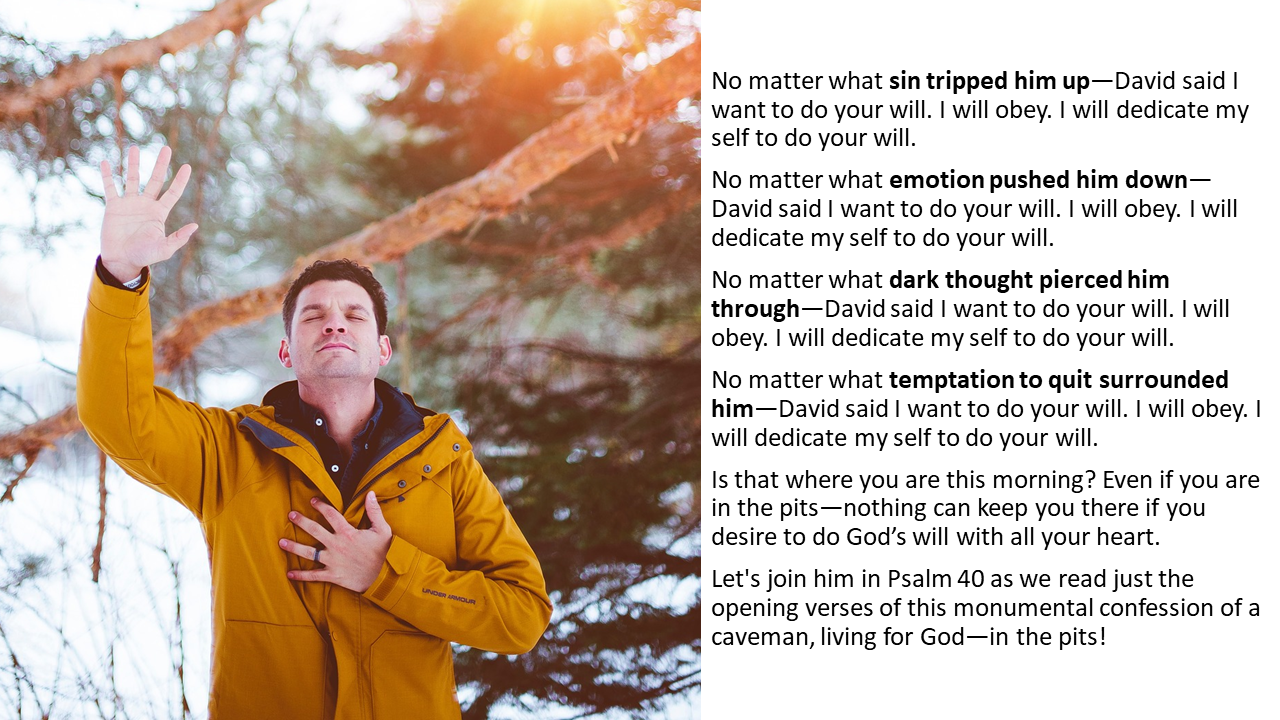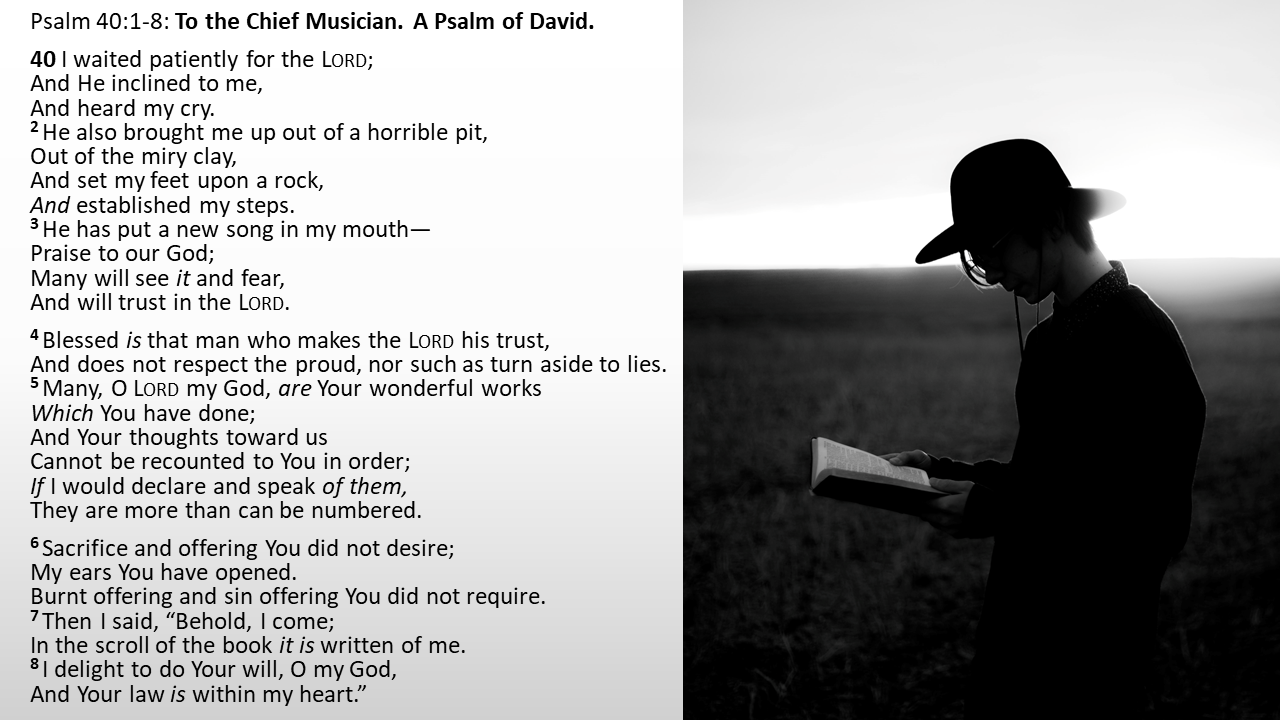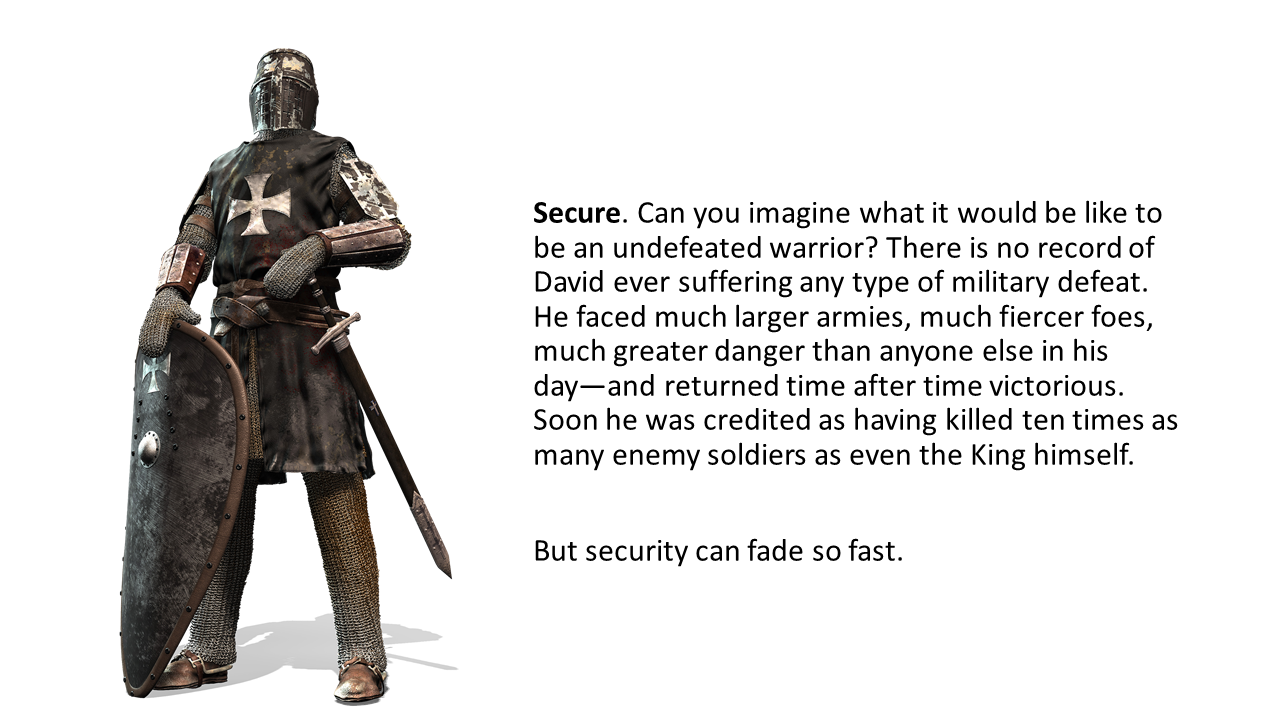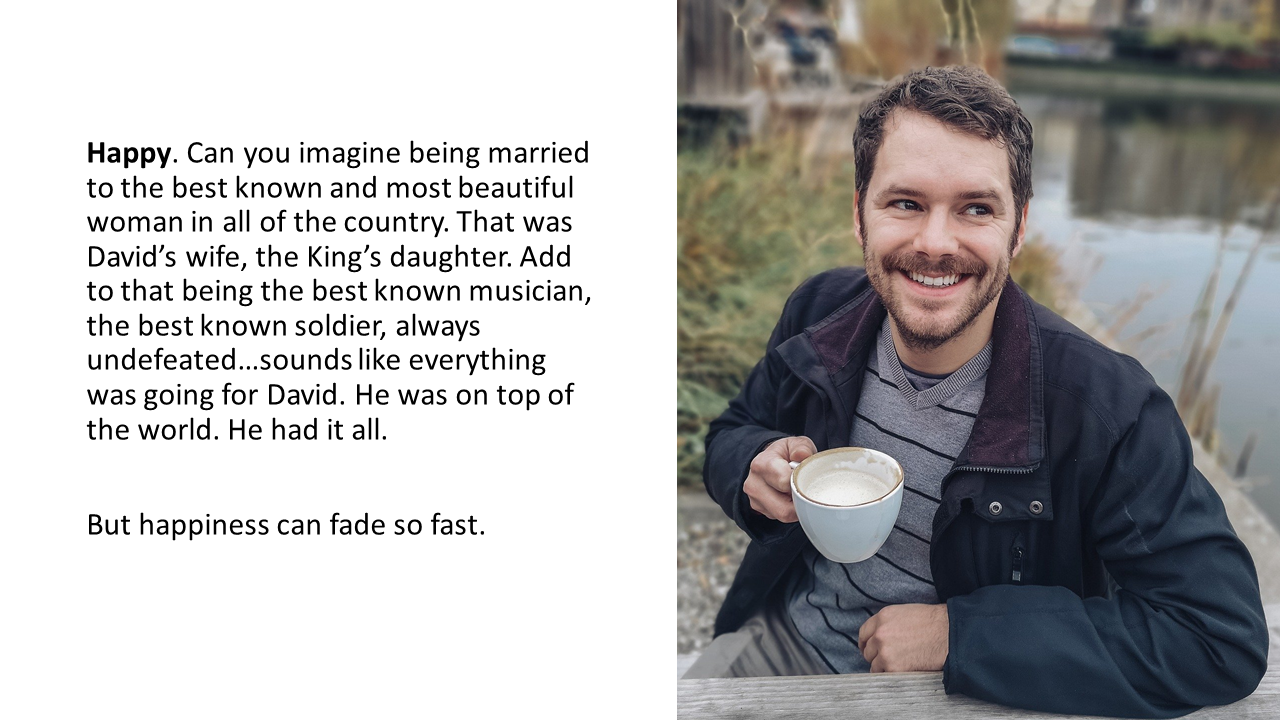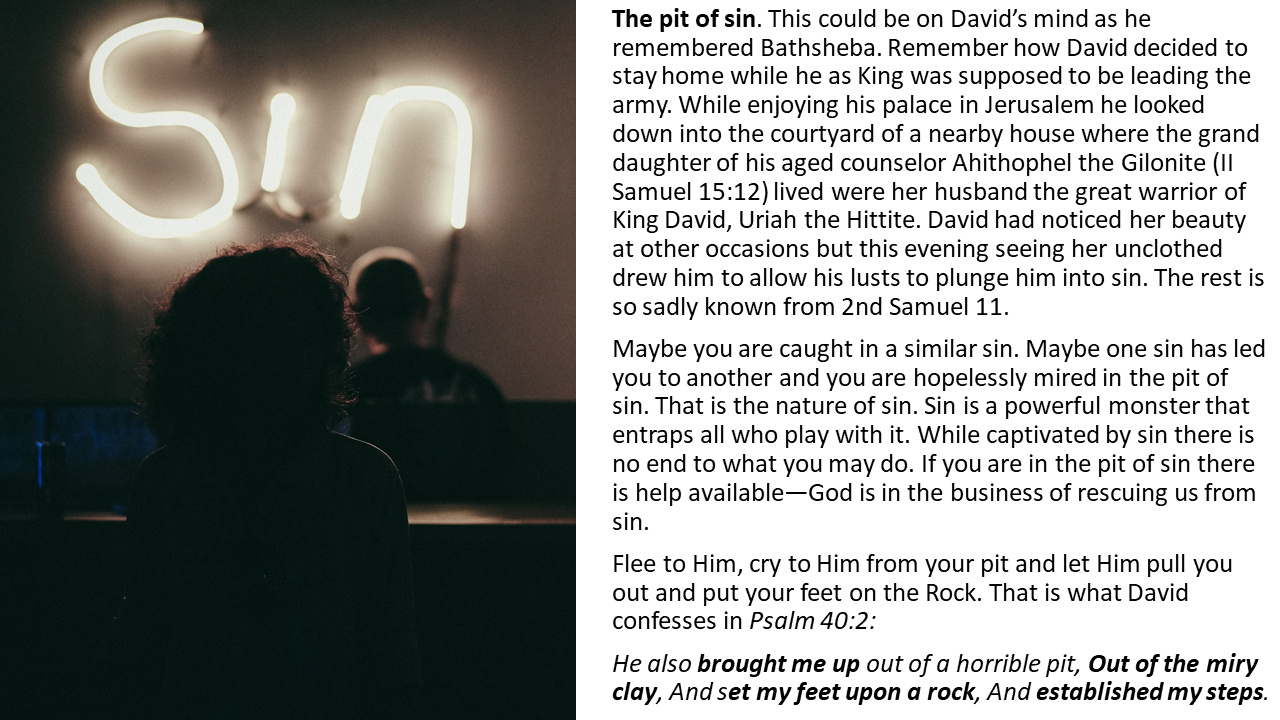If the YouTube video above is not available, here are two other ways to view:
Pathway to the Pits
050820AM
COR-14
Psalm 40
Pathway to the Pits
Fleeing to Christ as our refuge works in no matter what spiritual, physical or emotional state we find ourselves in—throughout all of our lives.
This morning in Psalm 40 David confesses for all the world to hear—that he has become stuck in the pits of life. And this Psalm is his fleeing to the Lord for refuge.
If the Psalm stopped there it would be so valuable for us to learn from. We would see how David got there and how he was delivered by the Lord.
But when you add to Psalm 40 the way that Christ and the apostles used this Psalm— now you have something very powerful to us this morning.
The key to Psalm 40 is verses 6-8 because they are our Lord Jesus Christ’s marching orders while here on Earth. Now that was not clear to us the reader, until the New Testament was written. Look for a moment at Psalm 40:6-8–
6 Sacrifice and offering You did not desire; My ears You have opened. Burnt offering and sin offering You did not require. 7 Then I said, “Behold, I come; In the scroll of the book it is written of me. 8 I delight to do Your will, O my God, And Your law is within my heart.”
Who is David talking about? Just about himself or Someone to come, greater than David? We can understand as we look at how the writer of Hebrews applies these verses in Hebrews 10:5-9–
5 Therefore, when He came into the world, He said: “Sacrifice and offering You did not desire, But a body You have prepared for Me. 6 In burnt offerings and sacrifices for sin You had no pleasure. 7 Then I said, ‘Behold, I have come— In the volume of the book it is written of Me—
To do Your will, O God.’ ” 8 Previously saying, “Sacrifice and offering, burnt offerings, and offerings for sin You did not desire, nor had pleasure in them” (which are offered according to the law), 9 then He said, “Behold, I have come to do Your will, O God.” He takes away the first that He may establish the second.
The writer of Hebrews explains that Psalm 40 contains a promise of Christ in the Old Testament. And as Jesus clearly explains to us—this is exactly what He came to DO! God’s will was Christ’s plan; it was Christ’s marching orders that He gladly followed.
And what was Christ’s repeatedly stated goal throughout all of His earthly life? Listen to Him speak in the Gospel by John.
John 4:34 Jesus said to them, “My food is to do the will of Him who sent Me, and to finish His work.
John 5:30 I can of Myself do nothing. As I hear, I judge; and My judgment is righteous, because I do not seek My own will but the will of the Father who sent Me.
John 6:38 For I have come down from heaven, not to do My own will, but the will of Him who sent Me.
John 8:29 And He who sent Me is with Me. The Father has not left Me alone, for I always do those things that please Him.”
And what were Christ’s last words of prayer in the Garden of Gethsemane that prepared Him for the Cross?
Luke 22:42 saying, “Father, if it is Your will, take this cup away from Me; nevertheless not My will, but Yours, be done.”
Back to Psalm 40 again please. Look at those key verses 6-8.
 “My ears You have opened” in Psalm 40:6b in Hebrew is literally “ears” or “two ears You have dug for me.” David is picturing his desire to reflect Christ’s coming obedience and dedication. This is a messianic Psalm, a look ahead through David’s life at the coming Christ.
“My ears You have opened” in Psalm 40:6b in Hebrew is literally “ears” or “two ears You have dug for me.” David is picturing his desire to reflect Christ’s coming obedience and dedication. This is a messianic Psalm, a look ahead through David’s life at the coming Christ.
David was told by the Spirit of God that this would be Christ’s desire—and that is the desire that David embraced, even in the deepest pits of discouragement, depression, despair, and loneliness.
• No matter what sin tripped him up—David said I want to do your will. I will obey. I will dedicate my self to do your will.
• No matter what emotion pushed him down—David said I want to do your will. I will obey. I will dedicate my self to do your will.
• No matter what dark thought pierced him through—David said I want to do your will. I will obey. I will dedicate my self to do your will.
• No matter what temptation to quit surrounded him—David said I want to do your will. I will obey. I will dedicate my self to do your will.
Is that where you are this morning? Even if you are in the pits—nothing can keep you there if you desire to do God’s will with all your heart.
Let’s join him in Psalm 40 as we read just the opening verses of this monumental confession of a caveman, living for God—in the pits!
Psalm 40:1-8. Pray
The pathway to the pit
Now let’s look at how David got into the pits before we see how the Lord rescued him. It all started in his mind and emotions.
 • Excited. Can you imagine how you would feel if you were a military hero who had actually saved and entire army and liberated a nation from military occupation? That describes David’s teen age life. His confrontation with Goliath sent shock waves through the entire region. The Philistine army had held Israel in mortal fear by fielding the ultimate weapon—a ten foot tall “Terminator” that could kill any challenger with dread fear by sheer size. David swift victory stunned and confused the enemy army and led to a resounding victory. But exciting times can fade so fast.
• Excited. Can you imagine how you would feel if you were a military hero who had actually saved and entire army and liberated a nation from military occupation? That describes David’s teen age life. His confrontation with Goliath sent shock waves through the entire region. The Philistine army had held Israel in mortal fear by fielding the ultimate weapon—a ten foot tall “Terminator” that could kill any challenger with dread fear by sheer size. David swift victory stunned and confused the enemy army and led to a resounding victory. But exciting times can fade so fast.
• Popular. Can you imagine what it would be like to be the best known musician for an entire nation? That describes David’s late teen aged years. He played for the royal events in King Saul’s palace. He was known, heard, seen, and sought as a brilliant musician and lyricist. He could write, he could play, and he could sing— and no one else in all of that country could compare to him. But popularity can fade so fast.
• Secure. Can you imagine what it would be like to be an undefeated warrior? There is no record of David ever suffering any type of military defeat. He faced much larger armies, much fiercer foes, much greater danger than anyone else in his day—and returned time after time victorious. Soon he was credited as having killed ten times as many enemy soldiers as even the King himself. But security can fade so fast.
• Happy. Can you imagine being married to the best known and most beautiful woman in all of the country. That was David’s wife, the King’s daughter. Add to that being the best known musician, the best known soldier, always undefeated…sounds like everything was going for David. He was on top of the world. He had it all. But happiness can fade so fast.
• Wham. And then suddenly everything changed. The king gets angry at him, the job gets terminated, the future plans are all cancelled, the family leaves, the home is abandoned, and life gets so hard David has what we would describe as a complete emotional and mental breakdown. That is Psalm 34 when David acted crazy before Achish King of Gath.
This leads to the dark days. Psalm 13 where we were last time records David at the bottom. He is emotionally, physically, and spiritually exhausted. David is dejected, depressed, discouraged and feels all alone, unwanted, and abandoned. Then he sees the Light—literally. He looks up at the end of Psalm 13 and sees that God is really there and he sings to Him.
But that doesn’t instantly change everything. Coming to God or even coming back to God doesn’t instantly solve all of our problems—but it does give us the pathway and the solution we need. That is where David finds himself in Psalm 40. He is learning how to live life in the pits, and how to get out of those pits—one step at a time.
Most of us don’t know very much about the dark side of life. We avoid it, flee from sin, and try to stay happy, busy and care free. But as we saw last time—David talks about what many of us have felt, and what some of us fear. David bares his soul for all the world to see. And with this amazing confession comes the pathway he followed, the trail out of the dark woods. That is what we need to see and follow today.
The path out of the pits—that would be a great title for this Psalm! If you have ever been in the pits, or know someone who has—listen and learn. This is a Divine gift to us in God’s Word!
Four Pits God Rescues us from!
 This Psalm can reflect any of the pits that David had lived through, and there were many. So it is possible to see him speaking of any era of his life—and maybe even of all of them! David was painfully aware of his own failures, weaknesses, shortcomings, and sins. He likens them to a pit and salvation as well as sanctification being lifted out of those pits all through life.
This Psalm can reflect any of the pits that David had lived through, and there were many. So it is possible to see him speaking of any era of his life—and maybe even of all of them! David was painfully aware of his own failures, weaknesses, shortcomings, and sins. He likens them to a pit and salvation as well as sanctification being lifted out of those pits all through life.
David was nearly always in close fellowship with God, and he wrote almost half of the psalms. By his writings and by his common speech he regularly and faithfully proclaimed the grace of God to others. Yet in Psalm 40 he describes himself as having been mired down in a pit from which he was unable to escape.
[Psalm 40 is] … the truth that muddy times may be the experience even of the greatest saints and slimy pits the lot even of kings and preachers. 1
What are the pits David was talking about? There are four possibilities drawn from various eras of David’s life. Remember, David wrote this after the events. He is looking back with an inspired view of life. God’s Spirit within him opened his mind and guided his words. Everything in this Psalm is exactly what the Spirit of God wanted him to say about these times in the pits. Here are the various pits that may be alluded to:
• The pit of defeat. This could be Saul in David’s mind. It was so hard. Saul could never be pleased no matter how hard David tried; or maybe it was Saul’s bitter hatred and jealousy at David’s success that defeated David; or even the bitter agony and defeat of David’s own son Absalom’s betrayal and attempt to destroy his father left David is despair.
What ever pulled David into the pit of defeat—God could rescue him. That is what David confesses in Psalm 40:1 I waited patiently for the Lord; And He inclined to me, And heard my cry.
• The pit of sin. This could be on David’s mind as he remembered Bathsheba. Remember how David decided to stay home while he as King was supposed to be leading the army. While enjoying his palace in Jerusalem he looked down into the courtyard of a nearby house where the grand daughter of his aged counselor Ahithophel the Gilonite (II Samuel 15:12) lived were her husband the great warrior of King David, Uriah the Hittite. David had noticed her beauty at other occasions but this evening seeing her unclothed drew him to allow his lusts to plunge him into sin. The rest is so sadly known from 2nd Samuel 11.
Maybe you are caught in a similar sin. Maybe one sin has led you to another and you are hopelessly mired in the pit of sin. That is the nature of sin. Sin is a powerful monster that entraps all who play with it. While captivated by sin there is no end to what you may do. If you are in the pit of sin there is help available—God is in the business of rescuing us from sin.
Flee to Him, cry to Him from your pit and let Him pull you out and put your feet on the Rock. That is what David confesses in Psalm 40:2 He also brought me up out of a horrible pit, Out of the miry clay, And set my feet upon a rock, And established my steps.
• The pit of bad habits. We must mortify our proud flesh, when David didn’t he may have thought of his pride that lured him into the sin of numbering the people. William James, in his classic Principles of Psychology, put it this way:
Could the young but realize how soon they will become mere walking bundles of habits, they would give more heed to their conduct while in the plastic state. We are spinning our own fates, good or evil, and never to be undone. Every smallest stroke or virtue or vice leaves its ever so little scar.
The drunken Rip Van Winkle, in Jefferson’s play, excuses himself for every fresh dereliction by saying, “I won’t count this time! ” Well! He may not count it, but it is being counted nonetheless. Down among his nerve cells and fibers the molecules are counting it, registering and storing it up to be used against him when the next temptation comes.
Nothing we ever do is, in strict scientific literalness, wiped out. Of course, this has its good side as well as its bad one.2
David new that the Lord could change him and get him started on a fresh new path. That is what David confesses in Psalm 40:3 He has put a new song in my mouth—Praise to our God; Many will see it and fear, And will trust in the Lord.
Bad habits can be replaced by new ones. This happens by small Spirit prompted choices each day to obey and do God’s will—that together form a new Spirit empowered habit.
• The pit of circumstances. If anyone could wallow in the despair of having all the worst of circumstances, David sure could. When he wasn’t running from Saul, he was fleeing his own country men, or the Philistines and everything in between. But when ever we think of hard circumstances look at Paul’s. Turn to 2nd Corinthians 11:24-28; 1st Corinthians 4:9-13; 2nd Corinthians 6:4-10.
1 Corinthians 4:9-13 For I think that God has displayed us, the apostles, last, as men condemned to death; for we have been made a spectacle to the world, both to angels and to men. 10 We are fools for Christ’s sake, but you are wise in Christ! We are weak, but you are strong! You are distinguished, but we are dishonored! 11 To the present hour we both hunger and thirst, and we are poorly clothed, and beaten, and homeless. 12 And we labor, working with our own hands. Being reviled, we bless; being persecuted, we endure; 13 being defamed, we entreat. We have been made as the filth of the world, the offscouring of all things until now.
2 Corinthians 6:4-10 But in all things we commend ourselves as ministers of God: in much patience, in tribulations, in needs, in distresses, 5 in stripes, in imprisonments, in tumults, in labors, in sleeplessness, in fastings; 6 by purity, by knowledge, by longsuffering, by kindness, by the Holy Spirit, by sincere love, 7 by the word of truth, by the power of God, by the armor of righteousness on the right hand and on the left, 8 by honor and dishonor, by evil report and good report; as deceivers, and yet true; 9 as unknown, and yet well known; as dying, and behold we live; as chastened, and yet not killed; 10 as sorrowful, yet always rejoicing; as poor, yet making many rich; as having nothing, and yet possessing all things.
2 Corinthians 11:24-28 From the Jews five times I received forty stripes minus one. 25 Three times I was beaten with rods; once I was stoned; three times I was shipwrecked; a night and a day I have been in the deep; 26 in journeys often, in perils of waters, in perils of robbers, in perils of my own countrymen, in perils of the Gentiles, in perils in the city, in perils in the wilderness, in perils in the sea, in perils among false brethren; 27 in weariness and toil, in sleeplessness often, in hunger and thirst, in fastings often, in cold and nakedness— 28 besides the other things, what comes upon me daily: my deep concern for all the churches.
2 Corinthians 12:9-10 And He said to me, “My grace is sufficient for you, for My strength is made perfect in weakness.” Therefore most gladly I will rather boast in my infirmities, that the power of Christ may rest upon me. 10 Therefore I take pleasure in infirmities, in reproaches, in needs, in persecutions, in distresses, for Christ’s sake. For when I am weak, then I am strong.
David wouldn’t let his circumstances defeat him and hold him down. That is what David confesses in Psalm 40:4 Blessed is that man who makes the Lord his trust, And does not respect the proud, nor such as turn aside to lies.
Christ is our refuge we can flee to Him at any time and in any condition—and He will never turn anyone away. So how did David get rescued from the pits? How did God lead him out? Here is the simple pathway recorded in this confession of God’s faithfulness he made from the pits.
 1. DAVID REMEMBERED GOD’S WORK IN HIS LIFE. David first notes the five ways God had worked in his life. Here is God’s grace directed towards David—Psalm 40:1-3 I waited patiently for the Lord; And He inclined to me, And heard my cry. 2 He also brought me up out of a horrible pit, Out of the miry clay, And set my feet upon a rock, And established my steps. 3 He has put a new song in my mouth— Praise to our God; Many will see it and fear, And will trust in the Lord.
1. DAVID REMEMBERED GOD’S WORK IN HIS LIFE. David first notes the five ways God had worked in his life. Here is God’s grace directed towards David—Psalm 40:1-3 I waited patiently for the Lord; And He inclined to me, And heard my cry. 2 He also brought me up out of a horrible pit, Out of the miry clay, And set my feet upon a rock, And established my steps. 3 He has put a new song in my mouth— Praise to our God; Many will see it and fear, And will trust in the Lord.
The first step out of the pits is to remember God’s work in our lives. David remember God’s work in his life.
2. DAVID REAFFIRMED HIS TRUST IN GOD. Psalm 40:4-5 Blessed is that man who makes the Lord his trust, And does not respect the proud, nor such as turn aside to lies. 5 Many, O Lord my God, are Your wonderful works Which You have done; And Your thoughts toward us Cannot be recounted to You in order; If I would declare and speak of them, They are more than can be numbered.
David verbally says that he trusts God. Sometimes we need to break the spiritual silence in our heart by talking to God. Telling Him what we know is true. Preaching the Gospel we believe—to ourselves! David reaffirmed his trust in God.
3. DAVID RENEWED HIS SUBMISSION TO GOD. Psalm 40:6-8 Sacrifice and offering You did not desire; My ears You have opened. Burnt offering and sin offering You did not require. 7 Then I said, “Behold, I come; In the scroll of the book it is written of me. 8 I delight to do Your will, O my God, And Your law is within my heart.”
Inviting God to open our ears is the key to submission with God. This is a dual analogy. Digging is a word for clearing away debris as well as deeply inscribing. These are the two steps to submission—clear out any hindrances that are in the way, and submit to the permanent marking of ownership.
 First, the Hebrew word literally means “to dig out”. Notice the other times it is used:
First, the Hebrew word literally means “to dig out”. Notice the other times it is used:
Genesis 50:5 ‘My father made me swear, saying, “Behold, I am dying; in my grave which I dug for myself in the land of Canaan, there you shall bury me.” Now therefore, please let me go up and bury my father, and I will come back.’ ”
• Like the grave—you dug things out of my life so that there was room for you to fill my life. A grave was where they laid what was dearest to them on earth. God is through excruciating times making room in my life to deposit something special.
Numbers 21:18 The well the leaders sank, Dug by the nation’s nobles, By the lawgiver, with their staves.” And from the wilderness they went to Mattanah,
• Like the well–You took everything out of my life painful as it was, in these lonely times, so that I could hear your voice clearly and your water could flow into my life.
Both are pictures of clearing things out of the way–so that the water can flow into the well, and to make room for something in the grave. So David says you dug my ears.
Newton wrote, “T’was grace that taught my heart to fear, and grace my fears relieved…”.
What a beautiful way to look at hard times!
God is tunneling a well of water to refresh me; God is making room to bury into my life His greatest treasures. But that is not all that David shares with us from this time in the pits. There is another exciting picture for us of submission to God.
The second way that David uses this word is to look back at an ancient Mosaic ritual. When a slave had worked their term of service and it was time to be free they were released to start out on their own. But if the slave loved their master and their work, they could request a lifetime servitude. This is covered in a fascinating ritual recorded in:
Exodus 21:1-6 “Now these are the judgments which you shall set before them: 2 If you buy a Hebrew servant, he shall serve six years; and in the seventh he shall go out free and pay nothing. 3 If he comes in by himself, he shall go out by himself; if he comes in married, then his wife shall go out with him. 4 If his master has given him a wife, and she has borne him sons or daughters, the wife and her children shall be her master’s, and he shall go out by himself. 5 But if the servant plainly says, ‘I love my master, my wife, and my children; I will not go out free,’ 6 then his master shall bring him to the judges. He shall also bring him to the door, or to the doorpost, and his master shall pierce his ear with an awl; and he shall serve him forever. (public, painful, and permanent)
For us on this side of the cross–here is such a moving picture of what God wants from us. He invites us to become His Bond slaves, servants for life. If we are willing and so desire we declare that publicly like Paul does so often. “I want to serve the Lord all my days”. Then we make some painful choices in life to limit our flesh, discipline our life, invest in the world to come instead of merely in this world. And when we make that offering of our lives that is reflected in Romans 12, it is a permanent service that goes through life and lasts forever.
Romans 12:1-2 I beseech you therefore, brethren, by the mercies of God, that you present (aorist infinitive—‘remain in the state of) your bodies a living sacrifice, holy, acceptable to God, which is your reasonable service. 2 And do not be conformed (present imperative ‘do not allow yourself to get squashed”) to this world, but be transformed by the renewing of your mind, that you may prove what is that good and acceptable and perfect will of God.
Galatians 2:20 I have been crucified with Christ; it is no longer I who live, but Christ lives in me; and the life which I now live in the flesh I live by faith in the Son of God, who loved me and gave Himself for me.
Thomas Chisholm says it best, “Oh Jesus, Lord and Savior—I give myself to Thee…”!
4. DAVID REPEATED TRUTHS ABOUT GOD—He is Righteous. Psalm 40:9-10 I have proclaimed the good news of righteousness In the great assembly; Indeed, I do not restrain my lips, O Lord, You Yourself know. 10 I have not hidden Your righteousness within my heart; I have declared Your faithfulness and Your salvation; I have not concealed Your loving kindness and Your truth From the great assembly.
 As David looked back over his life of loneliness, desperation, sorrow and fear—he saw one truth most clearly, God is Righteous. The key New Testament book on righteousness is Romans—mentioned 66 times we see God’s righteousness and our need of it. In Romans Paul declares that God is righteous in the four key areas that matter for eternity:
As David looked back over his life of loneliness, desperation, sorrow and fear—he saw one truth most clearly, God is Righteous. The key New Testament book on righteousness is Romans—mentioned 66 times we see God’s righteousness and our need of it. In Romans Paul declares that God is righteous in the four key areas that matter for eternity:
• God is righteous in declaring us as hopeless in our sin (1-2);
• God is righteous in providing for our salvation (3-5, 9-11);
• God is righteous in demanding our sanctification (6-8);
• God is righteous in bestowing gifts for our service (12-16).
So David’s life testifies to God’s righteousness. God is always faithful and what He does is right! So David says God is righteous. • God is righteous in my: Perilous years when I was a fugitive;
• God is righteous in my: Prosperous years when I was victorious in every battle and sat upon the Throne;
• God is righteous in my: Punitive years when I sinned and God had to chasten me;
• God is righteous in my: Peaceful years when I gathered treasures to build the Temple.
5. DAVID REJOICES IN GOD. Psalm 40: 11-17. The bottom line of life is—who do you want to please? There are only two possible choices at the deepest level. Either we please God or we in one way or another are seeking to please ourselves. David wanted God to be pleased. It started way back in his youth as we saw in Psalm 19.
Psalm 19:14 Let the words of my mouth and the meditation of my heart Be acceptable in Your sight, O Lord, my strength and my Redeemer.
David broke with the crowd, stopped getting and seeking approval from his peers and went straight to the top. He wanted God and God alone to be his goal. And that was still his desire.
One way or another we all get what we want in life. David wanted God. Do we? Really, down deep in your heart of hearts are you planning, figuring, calculating, scheming— how do give God more of your life? David was and did and look at him now—forever settled in Heaven as a man after God’s own heart.
6. DAVID INTERCEDES FOR OTHERS. Psalm 40: 16-17 Though we at times are desperate—God is not. He knows what is coming before it ever starts. God is managing every detail. What does David do in verse 4? He prays for others who sought God. What does that say to us? When we are alone and struggling it is the perfect time to pray for others who may be going through what we are facing. Here is a simple plan we can remember:
• Are you sick? Then pray for others who are sick—you know what they are going through!
• Are you abused by co-workers, family members, or classmates? Then pray for others going through the same pains and hurts.
• Are you in a dead end job? Then pray for hope for others that also face the daily struggle of what to do to survive in the days ahead.
• Are you successful and tempted to be selfish? Then pray for others you know who are also experiencing prosperity and ask God to keep them from selfishness and pride.
All of this was intended by God to prepare David for the throne—and how it did. What a great king he was. Like we saw this morning, from God’s creation we can learn a profound lesson. The mother eagle shows its love for its young by destroying their nest. Without this rude and painful start in their lives they would be too comfortable to ever learn to soar. Though they protest loudly the destruction continues until it is too painful to sit on all those sharp sticks—and they take flight. So God allows irritants
One final lesson–the message of Psalm 56, 34 and 70 is summarized in one of Paul’s most repeated exhortations, Philippians 4:6-7. If we could summarize these two verses they would say in the form of two imperatives: “Worry about nothing; pray about everything!”
 David rejoiced in God. Are you? Troubles—yes; pessimism—no!
David rejoiced in God. Are you? Troubles—yes; pessimism—no!
Poor and needy—always!
That is how I came, that is how I come, and You remain the same Oh Lamb of God!
1. Our Father which art in heaven, Hallowed be thy name. Thy kingdom come. Thy will be done in earth, as it is in heaven. Give us this day our daily bread. And forgive us our debts, as we forgive our debtors. And lead us not into temptation, but deliver us from evil: For thine is the kingdom, and the power, and the glory, for ever. Amen
For a moment turn back with me to First Samuel 21-22 and get our bearings. But before we head into the group event of all those men who flock to David—we will catch him all alone.
David wrote more Psalms during this time–than at any other time in his life. These cave Psalms are 4, 13, 40, 57, 70, 141-142—lessons on how to overcome the feelings of loneliness and abandonment when we are far from help, or away from home and feel unable to go on.
I wonder have you ever felt prehistoric? And I know if you’ve watched television very much you’ve seen the conditions of what cave men look like. For them life reduced to grunts and groans. And life is an endless pursuit of nothingness at times. I like the way Edna St. Vincent Mallay put it a few years ago she said: “life must go on . . . I just can’t remember why”.
That’s what I’m talking about— a cave man sort of existence. A life when a vicious swirl of getting up, going to work out of the home or in the home if you’re a mom— dropping into bed exhausted at the end of the day only to find out that the entire month has gone by and falling further behind instead of ahead. That’s the kind of life that I’m talking about and it’s not foreign to most of us. We know what it’s like; we know what it’s like when it’s hard.
Christ is our Lifelong Refuge from loneliness.
In I Samuel 22 where we will come to the fifth of the twelve severe times in David’s life portrayed in the Psalms.
David suffers intense loneliness as he feels abandoned while he begins to live and work with a tough crowd. In First Samuel 22:1-2 as he moved into a cave at Adullam with an incredibly difficult group of men.
David could have been overcome with fear and grief and despair—but God held him up. In latter life David looked back on these times and wrote another Psalm, let’s turn there next.
David had found a place he could always reach for safety and security—in any situation. The Lord was his refuge; the Lord is our refuge also. Christ our refuge is the safest spot in the Universe. He is the place we go when life gets tough.
Psalm 70 is the final Psalm from this time in David’s life. It is reflective as he looks back on this time and shares Lord!
Psalm 70:1-5 Make haste, O God, to deliver me! Make haste to help me, O Lord! 2 Let them be ashamed and confounded Who seek my life; Let them be turned back and confused Who desire my hurt. 3 Let them be turned back because of their shame, Who say, “Aha, aha!” 4 Let all those who seek You rejoice and be glad in You; And let those who love Your salvation say continually, “Let God be magnified!” 5 But I am poor and needy; Make haste to me, O God! You are my help and my deliverer; O Lord, do not delay.
 Cry to God when life is hollow. Life was so bad at this time that David says four times in verses 1, 5—make haste, come now, don’t wait, hasten. He says Lord I am not going to make it in this job, this marriage, this family, this sickness, this disaster. Quickly come, I am sinking and am going to perish.
Cry to God when life is hollow. Life was so bad at this time that David says four times in verses 1, 5—make haste, come now, don’t wait, hasten. He says Lord I am not going to make it in this job, this marriage, this family, this sickness, this disaster. Quickly come, I am sinking and am going to perish.
Don’t be surprised by troubles. For a moment think who this is—David the man after God’s heart. David the one Jesus is names after “Son of David” – and he had such a difficult life. Come to think of it, so did Moses, and Elijah, and Paul, and Peter—in fact, they all seem to have a hard life. If we look to the end of this Psalm we find in the conclusion the real goal God has for us. Real victory in life is not evading and escaping the majority of troubles that head our way. No, it is to seek that God be exalted through my life what ever He chooses to do with me and all my hard times.
Some practical steps to overcome loneliness are these:
• Live with mysteries. We can’t always know why God is allowing circumstances— but we do know we can trust Him to do all things well. Jesus said to His disciples in John 13:7, “What I am doing you do not understand now, but you will know after this.”
• Accept your situation. What is unchangeable must be accepted and lived through by God’s grace. As Paul said, we must echo, “I can do all things through Christ who strengthens me” (Phil. 4:13)
• Don’t be surprised by troubles. For a moment think who this is—David the man after God’s heart. David the one Jesus is names after “Son of David” – and he had such a difficult life. Come to think of it, so did Moses, and Elijah, and Paul, and Peter—in fact, they all seem to have a hard life. If we look to the end of this Psalm we find in the conclusion the real goal God has for us. Real victory in life is not evading and escaping the majority of troubles that head our way. No, it is to seek that God be exalted through my life what ever He chooses to do with me and all my hard times.
Psalm 57:4 My soul is among lions; I lie among the sons of men Who are set on fire, Whose teeth are spears and arrows, And their tongue a sharp sword.
What simple lessons can we find in cave times? Use lonely times to grow. One of the greatest truths we can discover is that lonely times usually accomplish great discoveries about God. David is at the depth of loneliness. He has been on the run for years and now he is hiding in a desolate cave in a crowd of malcontents, feeling very much alone. He has two choices. Stay in the cave of loneliness, descend into self-pity and sin or look up and use the time alone to grow.
Guess what David does? Psalm 142:5-7 is the answer.
As we look there, why don’t you take a moment and mark these for someone else who may need them someday. Or even for you if you ever feel the twinge of loneliness in your life. Look now and find:
• When alone I learn that You alone are my true REFUGE. Psalm 142:5a: loneliness means its time to flee to your Refuge. I will believe Your promise and turn to You as my Refuge right now.
• When alone I learn that You alone are my true PORTION. Psalm 142:5b: loneliness means its time to feed on your Portion. I will believe Your promise to be all I need in this hard time.
• When alone I learn that You alone are my true LISTENER. Psalm 142:6 ‘Give heed my cry’: loneliness means its time to speak to your Master. I will believe Your promise and pour out all my troubles to You who care for me.
• When alone I learn that You alone are my true DELIVERER “bring” Psalm 142:7a: loneliness means its time to trust in your Redeemer. I will believe Your promise and let You rescue me now.
• When alone I learn that You alone are my true OBJECT OF WORSHIP Psalm 142:7b: loneliness means its time to adore your Lord. I will believe Your promise and worship You even when I don’t feel like it.
• When alone I learn that You alone are my true PROVIDER “surround” Psalm 142:7c: loneliness means its time to rest in His Sufficient Provision. I will believe Your promise and let You surround me now with everything I need.
So again we ask ourselves—is Christ my refuge? Is that a personal chosen reality or just a fact I’ve heard? God will rock your boat just to see what you will do. Loneliness is a tool to glorify God, to turn and trust and triumph, and to make some great discoveries about God.
• Are you feeling the loneliness of youth? Jesus says I am always with you!
• Are you feeling the loneliness of life facing family conflict and danger? Jesus says I am always with you!
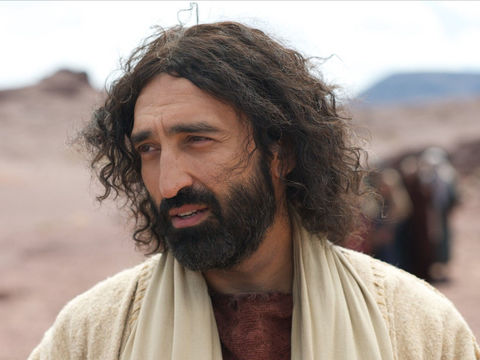
• Are you feeling the loneliness of job loss, and family separation? Jesus says I am always with you!
• Are you feeling the loneliness of moving to a new location that is very foreign to you? Jesus says I am always with you!
• Are you feeling the loneliness of living and working with a tough crowd? Jesus says I am always with you!
• Are you feeling the loneliness of unemployment and unsettled home life? Jesus says I am always with you!
• Are you feeling the loneliness of betrayal by friends? Jesus says I am always with you!
• Are you feeling the loneliness of being wronged in a business deal? Jesus says I am always with you!
• Are you feeling the loneliness of the complete loss of his family, friends, and finances? Jesus says I am always with you!
• Are you feeling the loneliness of temptation and failure? Jesus says I am always with you!
• Are you feeling the loneliness of chastisement and restoration? Jesus says I am always with you!
• Are you feeling the loneliness of old age? Jesus says I am always with you!
Put into I Samuel order
1. David suffers the intense loneliness of unemployment and unsettled home life. In First Samuel 22:5 and 23:14-16 as he was hiding from Saul in the Wilderness of Hareth, David takes time to write Psalms 17 and 63—how to overcome the feelings of loneliness when we are insecure. This was a time of no sure place to live, no reliable source of income and provision.
2. David suffers the intense loneliness when betrayed by friends. In First Samuel 23:10-13 as he escapes from Saul at Keilah and goes into hiding in the mountains of Ziph, David writes Psalms 31 and 54. In First Samuel 24:1-16 after he spares the life of his mortal enemy King Saul, David records his heart in Psalm 7. In First Samuel 23:29 as he hides in the cave at En-gedi, David writes Psalms 35-36—how to overcome the feelings of loneliness when we are betrayed.
3. David suffers the intense loneliness when wronged in business. In First Samuel 25 in the Wilderness of Paran as he faces the danger of his anger toward Nabal “the fool” and as God delivers him, David writes Psalm 53—how to overcome the feelings of loneliness when we are in danger of bitterness.
4. David suffers the intense loneliness of the complete loss of his family, friends, and finances. Finally in First Samuel 27 as he is grieved and endangered over the raid on his family and city of Ziklag, David writes Psalms 16, 38 and 39—how to overcome the feelings of loneliness when we are in threat of loss.
5. David suffers the intense loneliness of temptation and failure. From the depths of conviction after his fall into sin with Bathsheba in II Samuel 11, David writes Psalm 32—how to overcome the feelings of loneliness when we are tempted and fail.
6. David suffers the intense loneliness of chastisement and restoration. From the pain of chastisement that leads to repentance and restoration in II
Samuel 12, David sings of his faithful God in Psalm 51—how to overcome the feelings of loneliness when we are in chastisement and restoration.
Finally We Find David’s Testimony Of God’s Closeness During His Old Age or His Waning Years
7. David suffers the intense loneliness of old age. And finally, at the end of his magnificent life, David extolls his Master and King in Psalm 18—how to overcome the feelings of loneliness when we are in our last days before death. Especially note his life long praise to God in Psalm 18:46 The Lord lives! Blessed be my Rock! Let the God of my salvation be exalted.
Psalm 71 Christ our Refuge in the Loneliness of Weakness and Sickness before Death
Psalm 116 the Christ our Refuge in the Loneliness of Death
 • We are not lonely at death if we always remember He hears us. Psalm 116:1 I love the Lord, because He has heard My voice and my supplications.
• We are not lonely at death if we always remember He hears us. Psalm 116:1 I love the Lord, because He has heard My voice and my supplications.
• We are not lonely at death if we pour out our fears and needs. Psalm 116:2 Because He has inclined His ear to me, Therefore I will call upon Him as long as I live.
• We are not lonely at death if we always remember that troubles and sorrows are neither wrong nor avoidable. Psalm 116:3 The pains of death surrounded me, And the pangs of Sheol laid hold of me; I found trouble and sorrow. Every great saint since the Garden of Eden (except two) have died in pain of one form or another. Jesus died most painfully. It is not wrong or sinful to have troubles and sorrows—it is normal and also a part of God’s plan.
• We are not lonely at death if we seek the Lord’s aid when life hurts. Psalm 116:4 Then I called upon the name of the Lord: “O Lord, I implore You, deliver my soul!”
• We are not lonely at death if we praise Him for His mercy and goodness that have followed us all through our life. Psalm 116:5-7 Gracious is the Lord, and righteous; Yes, our God is merciful. 6 The Lord preserves the simple; I was brought low, and He saved me. 7 Return to your rest, O my soul, For the Lord has dealt bountifully with you.
• We are not lonely at death if we make it a habit to walk with God each day we live. Psalm 116:8-10 For You have delivered my soul from death, My eyes from tears, And my feet from falling. 9 I will walk before the Lord In the land of the living. 10 I believed, therefore I spoke, “I am greatly afflicted.” The same One who walks through life with us keeps walking and takes us through the Valley of Death’s shadows. And shadows of death are all we get—not death. Jesus said who ever lives and believes in Him will never die.
• We are not lonely at death if we drink from the cup of salvation. Psalm 116:12-13 What shall I render to the Lord For all His benefits toward me? 13 I will take up the cup of salvation, And call upon the name of the Lord. Believers never die!
• We are not lonely at death if we seek to obey Him during life. Psalm 116:14 I will pay my vows to the Lord Now in the presence of all His people. Jesus said His sheep hear His voice, follow Him—and He gives them endless life, even when their body dies!
• We are not lonely at death if we serve Him in life. Psalm 116:15-16 Precious in the sight of the Lord Is the death of His saints. 16 O Lord, truly I am Your servant; I am Your servant, the son of Your maidservant; You have loosed my bonds. Serving God is what saints are going to be doing forever!
• We are not lonely at death if we thank Him through life. Psalm 116:17-19 I will offer to You the sacrifice of thanksgiving, And will call upon the name of the Lord. 18 I will pay my vows to the Lord Now in the presence of all His people, 19 In the courts of the Lord’s house, In the midst of you, O Jerusalem. Praise the Lord!
Some practical steps to overcome loneliness are these:
1. Deal with sin. Be sure that there is no unconfessed or unforsaken sin left in your life to give the Devil a place in your life. (Eph. 4:27) 2. Share your burdens. Clearly tell the Lord all your fears, all your struggles, all your pains—remember that He knows our frame that we are dust. (Psalm 103) 3. Abandon all self-pity. Constant self-sorrow is a one way ticket to loneliness. Self-pity denies we have a responsibility to deal with our emotions and thus frustrates any cure. As Jesus said, coming after Him means we deny our self (Luke 9:23).
———————–
NOTES
Hiding from Saul Psalms 52 to 56 Cave starts 57
Psalm 57:7-11 is Psalm 108a; Psalm 108b is Psalm 60:5-12
Absalom Psalms are 63; 31; 55; 3
Move Psalm 38 to chastisement section Psalm 34 Abimelech Psalm 31 escape Keilah? Psalm 7 Benjamite Psalm 4 appeals for those slandering him v. 2-5
Mel Trotter 1870 – 1940
“I was there when it happened, January 19, 1897, 10 minutes past 9, Central time, Pacific Garden Mission, Chicago, Illinois, USA.”-Mel Trotter’s response when asked how he knew he was saved.”
Mel Trotter’s father was a drunkard who owned a saloon. His son followed in his footsteps, becoming an alcoholic before he was twenty. His mother was a godly woman, but Mel followed his father’s example. Trotter married, and he and his wife had a baby, but his appetite for drink continued. He would go weeks at a time without a drink, but then he would go on drunken binges again. Once he “drank up” the family horse and buggy, leaving them without any means of transportation. He returned home from a ten-day drinking spree to find his only child dead in his wife’s arms. Bitter and broken, he left home and went to Chicago. During the brutal winter he was reduced to selling his own shoes to finance his drinking. Finally even the saloons kicked him out. On his way to Lake Michigan, intending to drown himself, he passed by the Pacific Garden Rescue Mission. He was pulled inside and sat slumped through the testimony of Harry Monroe, a converted alcoholic, then superintendent of the mission. At the invitation, Trotter went forward and accepted Christ as his Savior. Mel and his wife moved to Chicago, and he spent nearly every night working at the mission. With Monroe he traveled to area churches seeking support. In 1900 a new rescue mission was established in Grand Rapids, Michigan. Trotter was asked to come and lead the new work. The Lord prospered the work there, and it grew and expanded until facilities were purchased which could handle 750 men. One of Trotter’s greatest victories was when the saloon next door to the mission was forced to close for lack of business. Trotter carried a burden for rescue missions in other cities as well. He helped found more than 65 other rescue missions during his life. It was not unusual for Trotter to be asked to fill in for R. A. Torrey or Billy Sunday in one of their great revival campaigns. The power of his personal testimony gave great weight to his preaching. Mel was not spared from the affects of alcohol on his body from those years of life in the pits of sin. Ill health marked the last few years of his life. He suffered from cancer which required repeated surgeries. He last preached at his mission in Grand Rapids in January 1940 for the 40th anniversary celebration of that great work. His favorite verse was II Corinthians 5:17. God truly made him a new creature.3
One Life God rescued from the pit of Sin.
John Newton
Who4 am I? My godly mother died when I was a young child. Reared by a sea captain father, taken to sea at age eleven, I soon forgot the Scriptures she had taught me.
Several years later, I was pressed into the British navy and became a midshipman. By then I had earned the reputation of being able to curse for two hours straight without repeating a word. Restless and wild, I tried to desert, was caught, stripped, whipped severely, and degraded to the ranks. I eventually ran away to Africa, but only so ‘I might sin my fill.’ And I did.
Debauched and distant from God, I fell into the hands of a Portuguese slave trader. For months the chief woman of the trader’s harem treated me like an animal, beating me and forcing me to grovel in the dirt for my food.
Reduced to a mangy cur of a man, I finally escaped and made my way to the shores of Africa. Picked up by a passing ship I earned the position of first mate because I was a skilled navigator. But while the captain was ashore one day, I broke out the ship’s rum and got the entire crew drunk. When the captain came back, he was so furious he hit me, knocking me overboard.
I would have drowned were it not for a sailor who pulled me back on board by spearing my thigh with a boat hood. The wound was so large that it left a scar big enough to put my fist in. Some weeks later, when the ship neared the coast of Scotland, it sailed into a storm and almost sank. For days I manned the pumps below deck in what seemed a hopeless nightmare.
It was then that I desperately called out to God. He answered my helpless cry, and I emerged from the hold of that ship to later become the chaplain of England’s Parliament and even to preach before the king. I am the vile blasphemer whom many would subsequently refer to as the second founder of the Church of England. And it was I who wrote:
Amazing grace! how sweet the sound, That saved a wretch like me! I once was lost, but now am found, Was blind, but now I see. These were the lyrics born out of my wayward, free-versed life. And to my ears, there is no sweeter sound than grace in all the world. Who am I? John Newton.
1 James Montgomery Boice, Psalms—An Expositional Commentary—Volume 1—Psalms 1-41, Grand Rapids, Michigan: Baker Books, 1998, p. 346-47.
2 William James, Principles of Psychology (Chicago: Encyclopedia Britannica, Inc. 1952), p. 83.
3 http://www.swordofthelord.com/biographies/trotter.htm
4 Swindoll, Shedding Light, p. 100-101.
Slides
Check Out All The Sermons In The Series
You can find all the sermons and short clips from this series, Christ our Refuge here.
Looking To Study The Bible Like Dr. Barnett?
Dr. Barnett has curated an Amazon page with a large collection of resources he uses in his study of God’s Word. You can check it out here.


